Organized Resistance to Civil Death
• Salute California Prisoners Demanding Rights
• 12,000 California Prisoners on Hunger Strike
• Letter from Calipatria Prison Hunger Strikers
• Demonstrations Defend Prisoners’ Rights
• California Department of Corrections Increases Threats to Hunger Strikers and Bans Lawyers
Salute California Prisoners Demanding Rights
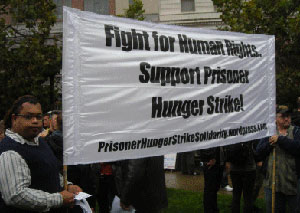 Prisoners in the Security Housing Unit (SHU) at Pelican Bay State Prison in California and many others across the state have organized their second hunger strike. The action has involved more than 12,000 prisoners and has broad support across the country and internationally.
Prisoners in the Security Housing Unit (SHU) at Pelican Bay State Prison in California and many others across the state have organized their second hunger strike. The action has involved more than 12,000 prisoners and has broad support across the country and internationally.
The prisoners are demanding an end to the torture of solitary confinement. At -Pelican Bay alone more than 500 people have been held in solitary for more than 10 years and another 78 for more than 20 years and one for 40 years. They are denied any physical human contact and kept locked down for 22-23 hours a day. They are also repeatedly subjected to state efforts to coerce them into naming their fellow prisoners as “gang members” or “gang affiliates” in order to be released from the SHUs or similar Administrative Segregation (Ad-Seg) units.
The prisoners have blocked efforts by prison officials to sow disunity along racial lines and by using threats and punishment, especially of leaders. Their first strike took place on July 1 and lasted almost four weeks and the second began September 26 and continues. The prisoners are united and firm in their demand for rights. Voice of Revolution salutes this courageous fight and the clear stand of the people involved that the state cannot do as it pleases and treat them as though they are not human beings with rights.
The prisoners contend with civil death, where their rights as human beings and as prisoners are denied by the state and federal government. This is especially true of prisoners who are political and fight for organized resistance. The three prisoners for example currently held the longest in solitary, 39 and 40 years respectively, were initially targeted for organizing Black Panther chapters while in jail and for opposing unjust conditions and treatment of fellow prisoners. All were framed on charges of killing prison guards. Many of the hundreds in long-term solitary have been labeled as “gang” members simply for having political books and newspapers.
Alongside the torture of solitary confinement, state officials are attempting to enforce a regime of coerced confessions, which are then used to put others into the SHUs and also justify continued solitary confinement for those already there. The arbitrary character of this regime can be seen in the fact that the label of “gang member” is commonly done mainly on the basis of these coerced confessions from fellow inmates, claims of association, possessing books dealing with resistance, which are considered “gang-related” and so forth. It is not based on actual gang activity or violence by those branded. Further, in a recent case, an individual who had agreed to “testify” – give false testimony – against fellow prisoners in exchange for release from SHU, faced a situation where officials reneged on their promises. When he then refused to provide further “testimony” this by itself was considered “gang-related” activity. As the court put it, “By aborting the process, petitioner demonstrated that he continued to associate with the gang, continued to pose a threat to prison security, and continued to warrant housing in a SHU.”
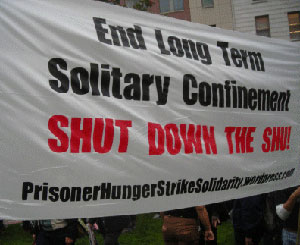 It should be noted that the current strike and similar resistance can readily be branded as “gang activity” by prison officials as it can be said to represent “conduct [that] endangers the safety of others or the security of the institution.” It is also the case that California, other states and the federal government are moving to define “any disruptive group” as a gang. Such branding would then be used to justify placement in the SHUs or keeping people from being released from the SHU. To the degree that such definitions are placed in law, resistance of all kinds can be branded as a “threat to security” by a “disruptive group.”
It should be noted that the current strike and similar resistance can readily be branded as “gang activity” by prison officials as it can be said to represent “conduct [that] endangers the safety of others or the security of the institution.” It is also the case that California, other states and the federal government are moving to define “any disruptive group” as a gang. Such branding would then be used to justify placement in the SHUs or keeping people from being released from the SHU. To the degree that such definitions are placed in law, resistance of all kinds can be branded as a “threat to security” by a “disruptive group.”
The decades-long practice of torture, coercion and civil death used in the state and federal prisons is already being used more broadly in the population. One obvious example is the mass round-ups of Arabs and Muslims following September 11. Much of the torture carried out in prisons like Guantánamo was first tested and perfected in U.S. prisons against mostly national minority prisoners. Many of those imprisoned were guilty of no crime and jailed solely on the basis of coerced confessions from government informants.
The “gang” label, like the “terrorist” label serves to justify torture and other brutal attacks on human rights in government efforts to break the people imprisoned and secure additional informants. It is brutal and unjust means to repress resistance using state terrorism, inside and outside of the prisons.
All of these practices violate the U.S. Constitution, including its requirements for due process and outlawing of cruel and unusual punishment. They also go against international legal principles. The readiness of the government at the state and federal level to openly pursue and justify these inhuman practices is indicative of the lawless state violence being imposed by rulers who have no solutions to the social problems the people face.
Voice of Revolution salutes the organized resistance of the prisoners, refusing to accept inhuman and unjust conditions and organizing under very difficult circumstances. We urge all to promote their struggle and lend a hand by supporting the various actions and organizing efforts taking place. The firm stand of the hunger strikers for rights and their refusal to submit to state organized terrorism inspires all to carry forward in resisting government crimes and developing a democracy of our own making, where such crimes are not permitted. As the prisoners are showing, fighting both to wrench concessions from the rulers so as to block their terrorism and building organized resistance to become the decision-makers is the order of the day.
[TOP]
12,000 California Prisoners on Hunger Strike
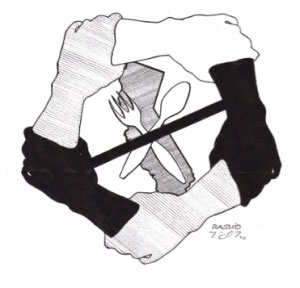 The courageous hunger strike by California prisoners has involved 12,000 prisoners in prisons across the state. Originating from Security Housing Units (SHUs) and Administrative Segregation Units (Ad-Seg and ASU) across California. Prisoners held at Pelican Bay State Prison and Calipatria, the main centers of resistance, as well as those in Centinela, Corcoran, Ironwood, Kern Valley, North Kern, Salinas Valley, California Rehabilitation Center in Norco, Pleasant Valley State Prison, San Quentin as well as West Valley Detention Center in San Bernadino County are currently participating. More than 3,000 California prisoners held in out-of-state facilities in Arizona, Mississippi and Oklahoma have also refused food.
The courageous hunger strike by California prisoners has involved 12,000 prisoners in prisons across the state. Originating from Security Housing Units (SHUs) and Administrative Segregation Units (Ad-Seg and ASU) across California. Prisoners held at Pelican Bay State Prison and Calipatria, the main centers of resistance, as well as those in Centinela, Corcoran, Ironwood, Kern Valley, North Kern, Salinas Valley, California Rehabilitation Center in Norco, Pleasant Valley State Prison, San Quentin as well as West Valley Detention Center in San Bernadino County are currently participating. More than 3,000 California prisoners held in out-of-state facilities in Arizona, Mississippi and Oklahoma have also refused food.
Family members of striking SHU prisoners reported that their visits are being denied by the California Department of Corrections and Rehabilitation (CDCR). Some were told they would not be permitted to visit as long as the strike continues. This is an effort to break the firm unity of prisoners, families and all those standing with the prisoners. It is to further isolate the prisoners and prevent reports on their conditions and spirit of resistance. Many also anticipate violence by prison officials, which prisoners then will be unable to report to family members. This is also no doubt why lawyers for the prisoners have also been banned by prison officials.
The prisoners resumed their hunger strike on September 26 after the CDCR failed to address demands made when prisoners initially went on strike for almost the entire month of July. The people in the various prisons are reporting heightened levels of intimidation and retaliation from prison officials since July. Despite this, thousands are participating in the current strike, demanding their rights.
Mediators who met with hunger strike representatives at Pelican Bay, one of whom had been transferred to Corcoran due to the strike, confirmed October 13 that prisoners there have decided to stop their hunger strike after nearly 3 weeks. The prisoners have cited a memo from the CDCR detailing a comprehensive review of every Security Housing Unit (SHU) prisoner in California whose SHU sentence is related to gang validation. The review will evaluate the prisoners’ gang validation under new criteria and could start as early as the beginning of next year. “This is something the prisoners have been asking for and it is the first significant step we’ve seen from the CDCR to address the hunger strikers’ demands,” says Carol Strickman, a lawyer with Legal Services for Prisoners with Children, “But as you know, the proof is in the pudding. We’ll see if the CDCR keeps its word regarding this new process.” The Pelican Bay prisoners also expressed their firm stand that if CDCR again refuses to take action, as occurred since July, they will resume their strike.
The mediation team also stated that while the memo indicates statewide changes in the “gang validation” process for SHU prisoners, the CDCR did not address the status of hunger strikers at Calipatria or Salinas Valley prisons, who are not SHU prisoners. These prisoners are continuing to refuse food and remain on hunger strike.
All of those waging this struggle stand behind the 5 core demands for all prisoners in California:
1. End Group Punishment and Administrative Abuse
2. Abolish the Debriefing Policy, and Modify Active/Inactive Gang Status Criteria. The branding as “gang” members is arbitrary, commonly based on false testimony, and often involves no “gang activity but rather things like possession of reading materials, associations with other prisoners, tattoos, etc. It is also used to secure false testimony and to target organizers and justify decades-long incarceration.
3. Comply with the US Commission on Safety and Abuse in America’s Prisons 2006 Recommendations regarding an End to Long-Term Solitary Confinement – CDCR shall implement the findings and recommendations of the US commission on safety and abuse in America’s prisons final 2006 report regarding CDCR SHU facilities as follows:
• End Conditions of Isolation (p. 14) Ensure that prisoners in SHU and Ad-Seg (Administrative Segregation) have regular meaningful contact and freedom from extreme physical deprivations that are known to cause lasting harm. (pp. 52-57)
• Make Segregation a Last Resort (p. 14). Create a more productive form of confinement in the areas of allowing inmates in SHU and Ad-Seg the opportunity to engage in meaningful self-help treatment, work, education, religious, and other productive activities relating to having a sense of being a part of the community.
• End Long-Term Solitary Confinement.Release inmates to general prison population who have been warehoused indefinitely in SHU for the last 10 to 40 years (and counting).
• Provide SHU Inmates Immediate Meaningful Access to: i) adequate natural sunlight ii) quality health care and treatment, including the mandate of transferring all PBSP- SHU inmates with chronic health care problems to the New Folsom Medical SHU facility.
4. Provide Adequate and Nutritious Food
5. Expand and Provide Constructive Programming and Privileges for Indefinite SHU Status Inmates.
For continued updates and more information, visit www.prisonerhungerstrikesolidarity.wordpress.com.
[TOP]
Letter from Calipatria Prison Hunger Strikers
The following letter is from inmates at Calipatria State Prison’s Administrative Segregation Unit, who are taking part in the hunger strike that began September 26. It is believed that 200 inmates in the prison’s segregation units have participated in the strike so far. According to the hunger strikers, the majority of prisoners in administrative segregation have been given indefinite terms in Security Housing Units, and are currently awaiting transfer to other institutions, most commonly Pelican Bay State Prison. Inmates awaiting transfer have been in segregation for an average of 3-4 years.
This letter particularly addresses the gang validation and debriefing processes, which place and keep many inmates in isolation units for an average of 6.8 years at Pelican Bay.
* * *
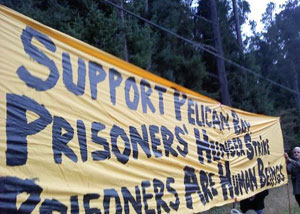 We are currently housed in Calipatria State Prison, in Southern California, where hundreds of men are going on day 8 of a “solid food hunger strike” in protest of the cruel and unusual punishment and the abuse of authority this prison has been doing.
We are currently housed in Calipatria State Prison, in Southern California, where hundreds of men are going on day 8 of a “solid food hunger strike” in protest of the cruel and unusual punishment and the abuse of authority this prison has been doing.
For over 20 years CDCR (California Department of Corrections and “so called” Rehabilitation) has been targeting all races amongst its prison population and handing out “indeterminate sentences” in segregation like it is the thing to do. This means that we are being placed in solitary confinement against our will secluded from the world; isolation. We are labeled as validated gang members who are alleged to have ties with prison gangs.
CDCR has their institutional gang investigators (I.G.I.) determine whether a person is a “validated gang member” or not. They have been known to be conspiring with one another and fabricating evidence to falsely prove a validation. Their main sources are debriefers (snitches) who will sell out their own mother if they had to. Once validated, one can only find their way out of this “torturous and inhumane” act of punishment of breaking people down by giving us three options – “Parole, Debrief, or DIE.”
It costs taxpayers $56,000 to house an individual in segregation annually and there are over 3,000 “clients” confined in isolation – do the math. What we have here is CDCR’s vague and misconstrued justification of their interpretation to their policies. Their objective to validating us as “prison gang members” is not to protect the General Population, rather to insure and guarantee that Hotel California’s Segregation Units have no vacancies so CDCR can keep those fat checks rolling in.
Like we mentioned in the beginning, we write this with inspiration from reading about the men and women standing up in unity to peacefully protest for what they believe in. As the world revolves so does the generation of human rights. It does not always take war to get your point across, which is why we stand strong in solidarity on this hunger strike.
We have three options… and if our voices are not heard the third option will be the likely one.
Respectfully,
Fellow hunger strikers at Calipatria State Prison ASU unit, 10/2/11
Another hunger striker at Calipatria’s Administrative Segregation Unit (ASU) wrote:
“Men of respect, men of honor, have committed their lives to the struggle. Literally placed their lives on the line in order to put a stoppage to all these injustices we are subjected to day in and day out. People would rather die than continue living under their current conditions. That’s why to me, it is a privilege, an honor to be apart of the struggle, to be apart of history for the betterment of not only “me” but for all those inside these cement walls…I have joined this second hunger strike once again full heartedly with a smile on my face. I will go as far as my body allows me to go.”
“I Will Never Be Tortured into Becoming an Informant”
Julie Tackett, an activist from Washington State, attended the August 23 hearing of the California Assembly’s Public Safety Committee on the topic of California’s Security Housing Units (SHUs). She read testimony on behalf of her friend, Bryan, who has spent more than 16 years in solitary confinement at Pelican Bay State Prison and took part in the July hunger strike for its duration. Below are portions of his statement.
* * *
“You know me well enough to know that I am in NO WAY suicidal, nor do I wish to harm myself in any way. But collectively we feel as though we are already dead under these conditions of extreme isolation and deprivation. I’m personally willing to go to this extreme in order to prove my desire to live. This is not life Julie…period. We are here for one reason only, our refusals to debrief. I’ve had no serious write ups in almost a decade. I have friends here who have 20-25 years in clean. Why are we here? Because we’re “labeled” as gang members.
“It has to be recognized that my validation as a gang member was based solely on the confidential debriefing reports of inmates who could no longer continue to suffer under these condition of perpetual isolation in solitary confinement. There is no individual accountability under the current CDCR policies. I have now been in solitary confinement for over a decade, not based on a CDCR rules violation but rather for a false label put on myself by inmate informants broken under SHU conditions. Now in the ultimate form of group punishment I am to be housed in solitary confinement, not based on my actions but based on this gang label.
“I fully participated in the “6 Year Inactive Review Process” but it is NOT a meaningful review process. I was photographed and given a list of debriefing statements to refute as well as having my cell thoroughly searched. I refuted every source item used against me relying on the language adopted in the Castillo agreement, which established the 6 Year Inactive Review Process. Not one piece of information (source item) used against me could meet the evidentiary standard of being less than 6 years old and criminal activity in furtherance of a gang, as established in the settlement of the Castillo case. Yet all source items were accepted.
“ I will never be tortured into becoming an informant based on perpetual isolation and frankly nor should I even be forced with such a choice. As a lifer I am not eligible for parole for years to come. As stated above, the 6 Year Inactive Review has shown itself to be a sham. I have been blessed by God to have a sound enough mind to survive all of these years in solitary confinement without becoming totally insane... I’ve never given up my hope I never will abandon this hope. It was under these conditions that we came to view the hunger strike as our last ditch effort to hopefully shine a light on such a destructive and hopeless environment.”
[TOP]
Demonstrations Defend Prisoners’ Rights
Thousands of people worldwide have come together to support the hunger strike by California prisoners that started at Pelican Bay and spread to many other prisons in California. California has the largest prison population in the country and the strike has involved more than 12,000 prisoners.
In California demonstrations took place in Los Angles, Long Beach, San Diego, Santa Barbara, Grass Valley, Chula Vista and Eureka on October 13. San Francisco also had an action October 13 and another October 14. Oakland held a community social October 8 and a demonstration is planned for October 20. On October 5, families of people in prison and community members organized a convergence in Sacramento to demand an end to the torture of solitary confinement and unjust branding of people as “gang members” to justify there long-term torture and confinement. Prison officials have retaliated against prisoners and their families, including denying them visits. A current campaign is also being organized to make 160,000 phone calls to Governor Brown, demanding an end to solitary confinement and the forced confessions program of “debriefing.”
New York City will host a panel discussion on the Pervasive Human Rights Violations in Prisons, focusing on the torture of solitary confinement. Students Against Mass Incarceration at Howard University in Washington DC have also expressed solidarity with the hunger strike. People in many cities are organizing 24- and 48-hour fasts in support of the strikers. Letters of support have also poured in from all over the world.
[TOP]
California Department of Corrections Increases Threats to Hunger Strikers and Bans Lawyers
In an effort to stop the hunger strike organized collectively by prisoners in the California prison system, the California Department of Corrections and Rehabilitation (CDCR) has been threatening participants with disciplinary action, writing them up for minor offenses, and banned two lawyers who represent the strikers.
Letters faxed to San Francisco lawyer Carol Strickman of Legal Services for Prisoners with Children and Berkeley lawyer Marilyn McMahon of California Prison Focus said they were banned from inmate visits as the department investigated whether they had “jeopardized the safety and security” of the prisons. Both women have been active advocates for the rights of prisoners at Pelican State Bay Prison, the supermax facility at the center of the hunger strike.
California Watch reports that the attorneys were banned under “temporary exclusion orders” that were signed by Corrections Undersecretary Scott Kernan on September 29. The order states that an investigation is underway to determine whether the lawyers “violated the laws and policies governing the safe operations of institutions within the CDCR.” No specific allegations were provided.
Shortly after it banned the lawyers, the CDCR issued a memo to all striking prisoners, informing them that “the department will not condone organized inmate disturbances.” The memo indicated that disciplinary action could be taken against inmates participating in the hunger strike, and that those identified as leaders could be placed in isolation in a Security Housing Unit. The memo did not state what might be done to those strike leaders already locked in solitary in the Pelican Bay SHU, where the strike originated.
As of September 2011, these SHU-prisoners continue to be subjected to CDCR’s human rights violations, in spite of the July 2011 hunger strike, when thousands of prisoners of all nationalities/groups united in their effort to condemn conditions and force an end to the barbaric practices of solitary confinement and forced confessions.
The state is also preparing to further repress those participating in the strike. Scott Kernan said, “Unlike in the first instance [in July] where we certainly evaluated their concerns and thought there was some merit to it, this instance appears to be more manipulative, and it certainly has the possibility of being a real disruption to the Department of Corrections and the security of its staff and inmates.” This indicates that prison officials are preparing to justify attacks on the prisoners for standing up for their rights.
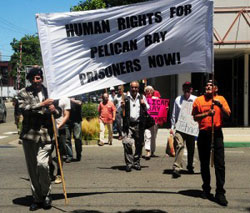 The widespread use of indefinite and long-term solitary confinement can be seen in figures recently released by CDCR regarding just Pelican Bay SHU inmates. More than 1100 inmates of Pelican Bay’s 3400 inmates are currently in the SHU. Of them, more than 513 have served 10 or more years in the SHU, and of those 513, 78 have been in the SHU for 20 or more years. In addition, 544 SHU inmates have been there for more than five but less than 10 years.
The widespread use of indefinite and long-term solitary confinement can be seen in figures recently released by CDCR regarding just Pelican Bay SHU inmates. More than 1100 inmates of Pelican Bay’s 3400 inmates are currently in the SHU. Of them, more than 513 have served 10 or more years in the SHU, and of those 513, 78 have been in the SHU for 20 or more years. In addition, 544 SHU inmates have been there for more than five but less than 10 years.
Statewide, according to CDCR Undersecretary of Operations Scott Kernan’s testimony, there are more than 3000 inmates in SHUs across California, though it is unclear as to whether or not inmates in Administrative Segregation Units are included in that figure.
According to California Watch, based on CDCR data, only 671 inmates since 1999 have qualified for a transitional program that allows “validated gang members” to return to general population cells from SHUs if they “show no signs of gang behavior for six years.” The arbitrary classification as “gang members” and the inability of getting out of the SHU without giving false testimony against other prisoners is why many SHU prisoners say that the options for getting out are “Debrief, Parole, or Die.” There are numerous cases of prisoners being validated as “gang members” due to possessing certain books, corresponding with gang members without any evidence of gang activity, and being identified as gang members by false testimony of inmates trying to get out of the SHU even if no gang membership had been otherwise established.
[TOP]
